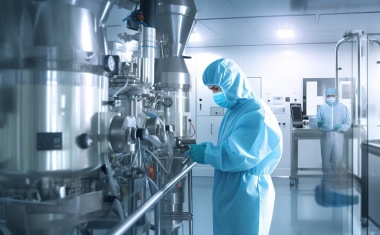
BioProcess Forum: Cell & Gene Therapy Manufacturing
Dive into the forefront of bioprocessing evolution this March, where our expert panel explores sustainability, bioseparations, and innovation in cell and gene therapy manufacturing.

Dive into the forefront of bioprocessing evolution this March, where our expert panel explores sustainability, bioseparations, and innovation in cell and gene therapy manufacturing.

Do you often have too little time for the things that matter most?

Cepsa Chemicals, an alkylbenzene producer, is working closely with key stakeholders at the American Cleaning Institute (ACI) to achieve more sustainable solutions for the Cleaning Industry

Learn more about JMP Pro, a powerful data analysis software tool that provides an intuitive and user-friendly interface for data visualization, modeling, and analysis.

Learn more about analyzing two types of curves: curves that can be described by a formula and curves that need to be described with a flexible fit.

This webinar dives into the contrast between testing variables “one at a time” vs. “testing several” through Design of Experiments (DOE).

By enhancing offerings, ensuring performance, managing costs, and embracing sustainability, distributors prove as essential partners for long-term success amidst evolving challenges.

In the rapidly evolving industry of contract development and manufacturing organizations (CDMOs), a well-defined pricing strategy is essential to drive growth and profitability. To stay ahead and participate in the expansion of the market, CDMOs need to transition to a structured value-based pricing approach that considers customer value, complexity, and specific needs.

With more than 80% of all chemical products manufactured using catalytic processes, catalysts are the number one value generator in the chemical industry.

The concept of a circular economy, where materials are recycled and reused, is becoming increasingly important in consumer packaging, driven by regulatory requirements and customer interest. Modern technical advancements make it easier to think of today's goods and products as the resources of tomorrow. One such product is plastic.

When developing an inhaled powder formulation, the drug particles’ properties are critical to successful delivery to the deep lung. The aerodynamic diameter is the key parameter, as it represents how well the particle flies in an air stream.

When manufacturing specialty edible fats, ensuring that the product has the desired properties – such as a stable shelf life, optimal melting behavior, and texture – is essential.

Ever since antibody drug conjugates (ADCs) were first reported in the 1970s, the field of bioconjugation has found itself in a constant state of evolution.

Many life science companies generate large swathes of data.

The demand for medicines is increasing rapidly and R&D pipelines have doubled over the last decade.

With their triumphant advance, biosimilars are also setting in motion the usual market mechanisms. Biopharma interest groups warn against the automatic substitution of originator drugs.

The pharmaceutical market is undergoing a profound transformation, driven by innovation among biologics and advanced therapies (ATs). This shift is not only redefining the treatment landscape but also presenting new opportunities and challenges related to the drug development and manufacturing value chain.

Contract development and manufacturing organizations (CDMOs) are a crucial part of the life sciences industry. Strangely, despite its current prominence, the CDMO industry is a relatively young one. There have been significant developments over its short lifespan, and it is likely that we see even more growth in the years to come.

In its latest European Chemicals Pulse Check, Deloitte surveyed senior executives in the European chemical industry and industry associations about their views on current market challenges, trends and opportunities.

China’s chemical industry originally focused primarily on basic chemicals, in line with the domestic needs of a developing economy and the lower technology requirements for the production of these materials. By now, China dominates the global market for many such chemicals – for example, the country accounts for about 55% of the global capacity for acetic acid, about 50% of the global carbon black capacity and about 45% of the global capacity for titanium dioxide. For many such commodity chemicals, China started out as a net importer, then built up domestic capacity and ended up being a major exporter.

Achieving sustainability targets and productivity improvements are primary levers that make operations teams successful. At MBCC Group, one of the leading construction chemicals players, Wayne Towell, Vice President of Operations has been driving various initiatives to track, monitor and enhance productivity of their plants across the globe.

As a global specialty chemicals company, Altana develops innovative technologies, solutions, and products with a clear customer focus. The company aims to strengthen and expand this position in the long term. The topic of digital transformation plays a key role.

As a global specialty chemicals company, Altana develops innovative technologies, solutions, and products with a clear customer focus. The company aims to strengthen and expand this position in the long term. The topic of digital transformation plays a key role.

European Energy, a Danish developer of solar farms, wind parks and Power-to-X solutions, has selected Clariant’s methanol synthesis catalyst MegaMax for its e-methanol project in Kasso, Denmark.

How Optimizing Process Parameters Can Improve Scalability and Manufacturability of a Cytotoxic Antibody Drug Conjugate.

After acquiring the two Catalonian sites in Barberà del Vallès and El Masnou about two years ago, Siegfried is now significantly expanding its expertise in the production of complex Drug Products containing Highly-Potent APIs (HPAPIs). In addition, the company has opened a new development center for oral solid dosage forms with active ingredients and HPAPIs as well as for ophthalmic sterile products. This not only strengthens Siegfried's position in the area of drug products, but also its global network and international competitiveness.

For Siegfried, sustainability is much more than a phrase with a green coating. The term, which encompasses social and economic criteria in addition to ecological aspects, is one of five central corporate values. One of the biggest levers for reducing energy and resource consumption in the pharma supply chain lies in the efficient production of active ingredients and pharmaceuticals. The company therefore works consistently on optimizing its processes.

The market for APIs is expanding significantly. Experts predict annual growth rates between 4.5 and 7.6 percent by 2029. There are plenty of good reasons for this: Chronic diseases are on the rise - and with them the need for medicines and active ingredients. In addition, the economic upswing in several emerging countries means that more people can afford novel medicines. APIs are also benefiting from the trend toward personalized medicine and the growing understanding of diseases. Meanwhile, API developers and manufacturers are working on increasingly sophisticated methods to better handle these delicate substances.

The Pharmaceutical industry must prioritize sustainability. Jürgen Roos, Chief Scientific Officer (CSO) of Siegfried, explains opportunities and limits of sustainability.

There are only a few chemical and pharmaceutical companies that look back at a history of 150 years. Certainly, many companies claim such a long legacy, but if you only count those that have been operating and thriving under the same name for a century and a half, the number boils down significantly.

Climate change, energy crisis, the call for a more environmentally compatible production method and socially responsible action do not stop at the pharmaceutical and biotech industries. Sustainability is becoming a central competitive and reputation factor and carries a high economic value. This need not be to the industry´s disadvantage. It helps companies to make processes more efficient, reduces energy consumption and keeps costs in check. But is the pharmaceutical industry already doing enough in this regard?

The Fill & Finish of biologic drugs is expensive and poses special technological challenges for CDMOs. At the German site in Hameln, Siegfried has successfully proven these capabilities over the past two years by producing Covid-19 vaccines and a significant number of clinical batches for several biological companies. By investing in its competencies, capacities and flexibility, the company intends to further expand this demanding but promising business area.

The CDMO (contract development and manufacturing organizations) business has a bright future, of that Siegfried CEO Wolfgang Wienand is certain. The economic advantages alone speak for this compared to in-house production by the pharmaceutical companies themselves. Although Siegfried has already reached sufficient critical size within its industry, he sees the company continuing on its growth path. The goal is to take over an even larger share of the value chain from pharmaceutical companies in the future.

Join our webinar and discover our Lohtragon L90 CI accelerator range!

Join our webinar and discover our Lohtragon L90 CI accelerator range!